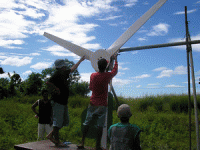
22 February 2010
Engineering students are to receive masterclasses in disaster relief, bridge building and sanitation when Scotland’s Engineers Without Borders conference takes place at the University of Strathclyde this week.
The international development conference is expected to attract students and professional engineers from across the UK to take part in hands-on workshops and lectures.
The event runs from Friday 26 to Sunday 28 February and will include a keynote speech by Dr Yusaf Samiullah OBE, Head of Infrastructure for the UK Department for International Development (DFID). Dr Samiullah has nearly 30 years professional experience in environment, infrastructure, urban and international development.
Sean Rivers, President of Strathclyde’s branch of Engineers Without Borders and a fourth year Mechanical Engineering student, said: “We’re extremely pleased to be hosting Scotland’s Engineers Without Borders conference, and are delighted to be welcoming Dr Samiullah as keynote speaker.
“Engineers Without Borders UK works to relieve global poverty by removing barriers to human development through engineering. It is fitting that the Scottish conference will touch on areas in which Scottish engineers are leading the way, including renewable energy and sustainable engineering projects.
“We’re also pleased that the conference will have a focus on students. Many engineers don’t consider working in international development until well into their careers, with training courses costing hundreds of pounds. It’s great that we’re able to bridge that gap.”
The event will include speeches by Andrew Lamb, CEO of Engineers Without Borders UK, and Professor Robert Kalin, Director of the University of Strathclyde’s David Livingstone Centre for Sustainability.
Workshops will include a session on disaster relief by RedR UK and Shelter Centre, and rural electrification by Strathclyde’s Gambia Project - an initiative that provides sustainable electricity to schools and communities.
Students at the University of Strathclyde have been involved with Engineers Without Borders UK since 2005 when they helped start the first Scottish branch. Its activities include placements abroad to countries including Sri Lanka, Ecuador and Malawi, training courses and events, and outreach projects to encourage school pupils to consider careers in engineering.
The students also play an active role in research projects, recently hosting a wind turbine building competition, and are currently designing a portable lighting system for use in Ghana.
The University of Strathclyde is home to Scotland’s largest Faculty of Engineering and world-leading research in energy and sustainability. Its courses include the pioneering Sustainable Engineering postgraduate training package which combines study in specialist, advanced engineering technologies underpinned with training in sustainability.
Tickets are still available for Dr Samiullah’s keynote speech on Friday 26 February at 7pm. To book tickets or find out more about Engineers Without Borders UK at Strathclyde, visit: http://www.ewb-strathclyde.org/




Swiss geoengineering start-up targets methane removal
No mention whatsoever about the effect of increased methane levels/iron chloride in the ocean on the pH and chemical properties of the ocean - are we...